Building up the model from a previous post, and the helpful answer, I've subclassed the MLEModel to encapsulate the model. I'd like to allow for two parameters q1 and q2 so that the state noise covariance matrix is generalized as in Sarkka (2013)'s example 4.3 (terms re-arranged for my convention):
I thought I would accomplish this with the update method below, but I'm running into problems with the fit method, as it returns a UFuncTypeError: Cannot cast ufunc 'multiply' output from dtype('complex128') to dtype('float64') with casting rule 'same_kind'. What am I missing here?
import numpy as np
import scipy.linalg as linalg
import statsmodels.api as sm
class Tracker2D(sm.tsa.statespace.MLEModel):
"""Position tracker in two dimensions with four states
"""
start_params = [1.0, 1.0]
param_names = ["q1", "q2"]
def __init__(self, endog):
super(Tracker2D, self).__init__(endog, k_states=4)
self.endog = endog
self._state_names = ["x1", "dx1/dt",
"x3", "dx3/dt"]
# dt: sampling rate; s = standard deviation of the process noise
# common to both dimensions
dt, s = 0.1, 0.5
# dynamic model matrices A and Q
A2d = [[1, dt],
[0, 1]]
A = linalg.block_diag(A2d, A2d)
Q2d = [[dt ** 3 / 3, dt ** 2 / 2],
[dt ** 2 / 2, dt]]
Q = linalg.block_diag(Q2d, Q2d)
# measurement model matrices H and R
H = np.array([[1, 0, 0, 0],
[0, 0, 1, 0]])
R = s ** 2 * np.eye(2)
self["design"] = H
self["obs_cov"] = R
self["transition"] = A
self["selection"] = np.eye(4)
self["state_cov"] = Q
def update(self, params, **kwargs):
self["state_cov", :2, :2] *= params[0]
self["state_cov", 2:, 2:] *= params[1]
# Initialization
m0 = np.array([[0, 1, 0, -1]]).T # state vector column vector
P0 = np.eye(4) # process covariance matrix
# With object Y below being the simulated measurements in downloadable
# data file from previous post
with open("measurements_2d.npy", "rb") as f:
Y = np.load(f)
tracker2D = Tracker2D(pd.DataFrame(Y.T))
tracker2D.initialize_known((tracker2D["transition"] @ m0.flatten()),
(tracker2D["transition"] @ P0 @
tracker2D["transition"].T +
tracker2D["state_cov"]))
# Below throws the error
tracker2D.fit()
